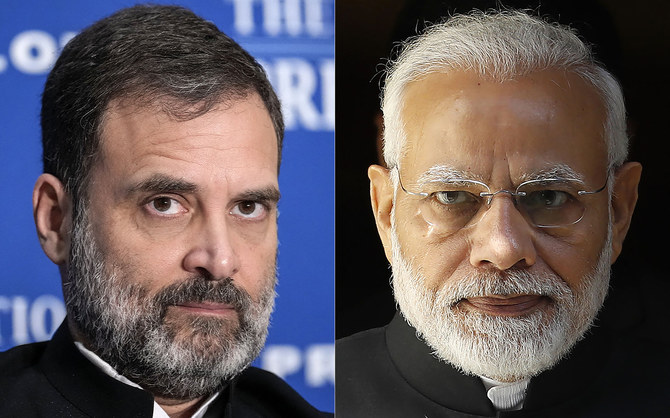The government of Indian Prime Minister Narendra Modi defeated a no-confidence motion in parliament on Thursday after a fiery speech by the premier at the climax of a three-day debate.
Opposition lawmakers — who had brought the motion over months of ethnic violence in Manipur state — walked out of the chamber, prompting a furious rebuke from the premier, with the government then winning the vote.
The walkouts, according to broadcasters, included Congress party leader Rahul Gandhi, who on Wednesday said Modi’s government was “set on burning the whole country.”
Modi denounced them, saying: “Those who don’t trust democracy are always ready to make a comment but don’t have the patience to hear (the rebuttal).”
They would “speak ill and run away, throw garbage and run away, spread lies and run away,” he added, to cheers from his own benches.
“This is their game and the country can’t expect much from them.”
The no-confidence vote was dismissed by the government ahead of the vote as a headline-grabbing gimmick ahead of a general election next year.
Modi’s Hindu-nationalist Bharatiya Janata Party (BJP) has a large majority in the 543-member lower house, and is widely expected to win a third term in power.
Its muscular appeals to India’s Hindu majority have proven a winning formula, and Modi has already steered it to two landslide victories over Gandhi and his Congress party.
“I can understand the Congress party’s problem,” Modi said Thursday. “They have been launching the same failed product again and again, but the launch fails every time.”
‘Peace in Manipur’
Gandhi, 53, is the son, grandson and great-grandson of three former Indian premiers.
He spearheaded the parliamentary attack on the government Wednesday, condemning what he said was Modi’s inaction over the deadly Manipur violence.
In a speech to lawmakers, Gandhi had charged that Modi was “killing Mother India.”
The opposition leader was restored to parliament on Monday after the Supreme Court suspended his defamation conviction over past comments criticizing Modi.
Gandhi had been sentenced to two years’ imprisonment in March in a case that critics flagged as an effort to stifle political opposition in the world’s largest democracy.
Modi’s party has been repeatedly accused by political opponents and rights groups of fomenting religious divisions for electoral purposes.
At least 152 people have been killed in Manipur since May, according to government figures, after armed clashes broke out between the predominantly Hindu Meitei majority and the mainly Christian Kuki community.
The state has fractured on ethnic lines, with rival militias setting up blockades to keep out members of the opposing group.
On Thursday, Modi called the violence “saddening” and said that “there will be peace in Manipur in the coming times.”
Tens of thousands of additional soldiers have been rushed from elsewhere to contain the violence, and a curfew and Internet shutdown remain in force across Manipur.
Human Rights Watch has accused BJP-led state authorities in Manipur of facilitating the conflict with “divisive policies that promote Hindu majoritarianism.”
Modi faced a barrage of criticism from opponents for taking more than two months to speak about the conflict.
He broke his silence in July after the publication of a graphic video showing a baying mob parading two Kuki women naked, saying that the incident had filled his heart with “pain and anger.”
























